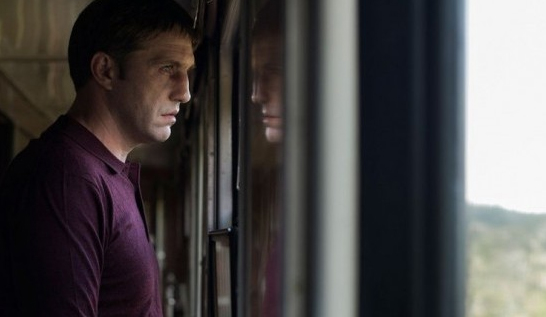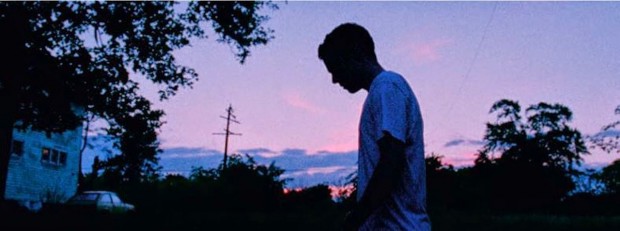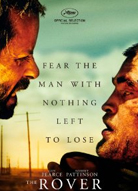Cannes Diary: 3 Men Against The System – Leviathan, Lost River & The Rover
 Tuesday, May 27, 2014 at 7:41AM
Tuesday, May 27, 2014 at 7:41AM Diana Drumm reporting from Cannes... or rather flying home from Cannes as you read this...
As people, we are defined by how we cope with the world’s cruelty, injustice and unfairness. In a leap of metaphysics, the same can be said about films, being judged by how they handle the subject and in turn how their protagonists handle their conflicts and struggles. At this year’s Cannes, there were more than a few films in the thick of existential waters and questions of morality, with protagonists leading the way against a larger society. In Timbuktu, a farmer and his family grapple with a newly inserted regime to dire results. In Amour Fou, a young poet stakes the life of himself and his “lover” on an escapist higher philosophical notion he’s concocted. In Foxcatcher, an “ornithologist, philatelist, philanthropist” attempts to fabricate a more successful legacy for himself and melts down after reality and other people’s free will gets in the way. Here are three more that tackle the issues of male insecurities when faced with a larger, opposing system (from the great to the already infamously bad to the steady).
Andrey Zyvagintsev’s Leviathan, Ryan Gosling's Lost River, and David Michôd's The Rover after the jump...

Leviathan
Winner for Best Screenplay at Cannes, Andrey Zyvagintsev’s Leviathan is a dark comedic tome about car mechanic Kolya (Alexey Serebryakov) struggling against a corrupt local government and the crumbling of his family unit. Set in a remote Russian former-fishing village (with the washed-up whalebones to prove it), the tyrannical mayor (Roman Madyanov) wants take control of Kolya’s lands, along with most of the town. As Kolya stays put, the mayor throws an extensive list of violations his way as a means of intimidation. Enlisting his close friend and Muscovite lawyer Dmitri (Vladimir Vdovitchenkov), Kolya isn’t going down without a fight. Dmitri has a few tricks up his sleeve -- some handy blackmail for the mayor, some not-so-handy handsiness for Kolya’s wife. As both these conflicts reach a head, they result in violence, emotional messiness and even more despair for Kolya.
Melding the Book of Job with Thomas Hobbes (See: Thomas Hobbes’s “Leviathan”) in modern Russia, Leviathan follows Kolya’s questioning of governmental authority and ties that to his disbelief in the Russian Orthodox Church. In a last-ditch depressive moment, Kolya speaks to a local priest who then tells him of Job. In the priest’s telling, he blames the boils and other ills on Job questioning God rather than the standard angle of God testing Job’s faith after a bet with Satan, making you question the intentions of said priest. Along these lines, the film is littered with anti-authoritarianism and subversive images: from target practice with portraits of former Russian political leaders to a traffic cop’s dashboard displaying a few saints while his glove compartment features a few topless women. Though the film tackles such lofty philosophical and political issues, its deft editing manages to keep the pace going (outside of a tedious-to-comic-effect court scene) while juggling its overall unease with bouts of hilarity.
Possibly the funniest film out of Cannes (I missed Wild Tales), Leviathan is fraught with vodka-swilled deliveries of great one-liners (life as “a prolonged leap from the twat to the grave”) and some that become all the more meaningful on reflection (while a friend’s son shoots at Lilya with a toy gun, the friend says, “Men are all the same. First, you’re pretty. Then they’ll kill you.”). As Leviathan ends, the unease continues, not just because of the swirling tides or the whale carcasses still strewn around town, but because of the film’s indictment of authority and the pervasiveness of that indictment throughout contemporary society. This is the sort of film that will leave critics, both of film and society, ruminating for years and years from its epic ensemble storytelling structure to the pieces left ambiguously offscreen to its unnamed vague though searing commentary on a certain controversial Russian political figure (cough, Putin, cough).

Lost River
Trashed with the speed of tweets and booed on Cannes arrival, Ryan Gosling’s Lost River is about a young man named Bones (Iain De Caestecker) trying to look out for his family in the face of the destruction of his hometown. Like Leviathan, Lost River is set in a desolate, fictional though all-too-real town of Lost River (based around Detroit, where the film was shot) and features the impending bulldozer of corrupt officials (this time, a bank manager). That’s roughly where the similarities end since Leviathan is a brilliant dark meditation with nods to the Bible and philosophy and Lost River is a neon-lit brooding nightmare with lifts from Lynch, Malick and Refn.
Between scrapping copper and running away from the local bully literally named Bully (played to unintentionally hilarious effect by Dr. Who’s Matt Smith), Bones doesn’t get very far in his plan to take care of his mother Billy (Christina Hendricks) and younger brother Franky (Landyn Stewart). In the face of foreclosure on their house due to a very ill advised subprime mortgage loan (timely, eh?), Billy accepts a job at a “theater of horrors”-type nightclub run by her sleazy local bank manager (played to giving-the-willies perfection by Ben Mendelsohn). Meanwhile, Bones befriends neighbor Rat (Saoirse Ronan), who herself has a rat named Frank and a creepy, non-speaking Miss Havisham-meets-Blanche Dubois grandmother lurking in her living room. Things transpire: a burning bike floats into frame, the rat gets it... and at one point, Billy becomes literally objectified in a creepy clear sarcophagus-like apparatus, bending to her every curve for the pleasure of perverted clientele. All of this could have been great, in line with a distinct modern gothic storytelling, even with its influence-swirl of Malick, Refn, and Lynch. But it comes off as a derivative bumpy tumble through Indie Film 203 (not quite the basics but definitely not onward to the Masters degree). And no, not even Ryan Gosling can “Hey girl” out of that or this film’s creep factor. That said, it’s still worth a watch as a fun-lit, cringe-inducing rollercoaster ride.
 The Rover
The Rover
If Lost River was a roided-up Charlie and the Chocolate Factory boat ride, The Rover would be a slowed-down, dustier version of Six Flags Great Adventure’s Rolling Thunder… Sometime in the not-so-distant future (or as the film refers to it, 10 years after “the collapse”), reticent everyman Eric (admirably outfitted by Guy Pearce) sets out after the three men who stole his car through the dire deadlands of rural Australia. With the powers-that-be nowhere in sight, it’s up to Eric and his cinematic determination to set things right. Feeling a bit like Mad Max meets The Road but not as heavy as that reads, David Michod’s The Rover follows its mission well, portraying a future world of ill morals and desolation through many shots of lone figures near-lost in a vast landscape and the up-the-back creepiness of a world gone mad (an old grandmother turns out to be little less than a madame, dogs have to be caged in order to protect them from humans, they only accept American dollars…).
Along the way, Eric stumbles on Rey (Robert Pattinson), the injured fourth member of the gang who stole his car. Left behind for dead, Rey is a slower-witted young man with a Southern accent and a glazed look in his eyes. While Pattinson could have easily fallen into exaggeration or mental disability clichés, he portrays Rey with a wide-eyed earnestness weighed down by self-doubt and insecurities about his brother’s loyalty and an accent authentic-sounding enough to add rather than detract from that quality. As a testament to the director, actor and character, one of the festival’s most resonating shots (up there with Xavier Dolan’s play on aspect ratios in Mommy) involves Rey, a car and a pop song framed in a shroud of nighttime darkness. As the unlikely pair make their way, Rey leads Eric back to the gang’s hideaway while Eric proves that he is willing to kill anything that gets in that way and the two open up a bit here and there but never quite bond.
What sets The Rover apart from your standard middle-brow dystopic film is the moving ending, which retroactively justifies the pacing and the familiar plotting . It may not be an all-out hit or miss, but The Rover is a steady film that manages a high concept over low-dialogue in 102 minutes.



Reader Comments (3)
I just knew US/western critics will love Leviathan lol Imo it was the weakest of his films
I personally hope Andrey will be back to his more subtle filmmaking ala the Return & Elena.
Diana: I doubt it was unintentionally hilarious. Considering his build (below average) and the scene of him saying "Look at my muscles" thirteen times? I think he was meant to be some sort of dark comic relief.
Lily, I'm a bad cinephile and haven't seen those two films. Looking forward to watching them if they're better than Leviathan. It was definitely one of the top of the fest.
Volvagia, In the film, Smith's repetition of "Look at my muscles" seemed to be meant as off-putting and funny in an eery way, kind of like a delusional "Come out and play-ay" moment, rather than as a laugh riot. The tone of the film is very dark, very arty, taking itself very seriously while also leaving you to wonder whether it actually took itself that seriously..